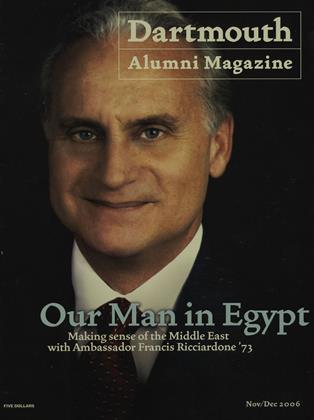CLAIM TO FAME: "Fame comes and goes in waves. One isn't so aware of one's fame before hearing about it from others," says Rosenthal, whose most recent book, Angelica Kaufman:Art and Sensibility (Yale University Press, 2006) has generated international interest. Kauffman, little known in America today, was one of the most internationally renowned artists of the 18th century. "One has to appreciate how she emerged as such a central figure in the art world at a time when women were associated with the private or domestic sphere," says Rosenthal. "Rousseau said: 'Woman has no place in the public sphere. If she is, she is no woman.' But Kauffman brilliantly negotiated the expectations addressed to women—such as sentimentality and speaking for private virtues—in her paintings in such away as to keep them from appearing transgressive."
EDUCATION: Primarily educated in her native Trier, Germany, Rosenthal also studied art history, social anthropology and psychology in London, Italy Russia, Poland and Austria before receiving her Ph.D. in art history from Trier University in 1994.
TEACHING EXPERIENCE: After two years as the Andrew W. Mellon Assistant Professor of Art History at Northwestern University, Rosenthal came to Dartmouth in 1997. Teaching for the art history department and the women's and gender studies program, her courses include "Art of the Eighteenth Century," "The Nineteenth Century: Visions of Modernity," "Orientalism, Race and the Power of Representation," and "Women Artists and Gender Theories (1550-the Present)."
RACE, GENDER AND ART: Back on campus following a year-long Paul Mellon Centre Senior Fellowship in London, Rosenthal is working on her next book The White of Enlightenment: RacializingBodies in Eighteenth-Century British Art and co-editing another about slave portraiture, the subject of an international conference hosted by Dartmouth in 2004. "I'm fascinated by the paradoxical relationship between slaves and portraiture," she says. "Portraits are a formal recognition of the self-possessed, while slaves were dispossessed, subsumed under their masters. Slave portraiture raises fundamental questions of what is subjectivity in representation." Next fall Rosenthal will direct a Humanities Institute workshop: Visual Humor in Ideas of Race, Nationality and Ethnicity.
THOUGHTS ON DARTMOUTH: "I especially value my seminar-style classesthe conversational format requires more student involvement and I learn a lot from them." Of challenging students to give formal slide presentations at the end of seminars she says, "It's incredible, they give me so much more than they do just speaking from their chairs."
FAVORITE STORY: "I'm always touched to receive postcards from students who studied with me years ago. Sometimes out of nowhere I'll get a postcard from the Louvre or another museum, from a student remembering a work we discussed. It makes me happy to think that things live on and mean something."
OFF CAMPUS: Married to fellow Dartmouth art professor Adrian Randolph, Rosenthal loves city travel, reading and theater—and swimming and rowing on Goose Pond in Hanover. "I also like taking a picnic lunch somewhere instead of going to Collis. It's nice to pretend even for an hour that you are on vacation," she says.
 View Full Issue
View Full Issue
More From This Issue
-
 Cover Story
Cover StoryOur Man in Egypt
November | December 2006 By DIRK OLIN ’81 -
 Feature
FeatureNot Your Mother’s Bible
November | December 2006 By CATHERINE FAUROT, MALS ’05 -
 Feature
FeatureHistory Detective
November | December 2006 By Matthew Mosk ’92 -
 ALUMNI OPINION
ALUMNI OPINIONFailing the Test
November | December 2006 By John Merrow ’63 -
 OFF CAMPUS
OFF CAMPUSReturn of Pinto
November | December 2006 By Christopher Kelly ’96 -
 Sports
SportsTips of the Trade
November | December 2006 By Courtney Banghart ’00
Lauren Zeranski '02
-
 Article
ArticleClass of 1976
May/June 2005 By Lauren Zeranski '02 -
 Profile
ProfilePROFILE: Annelise Orleck
Sept/Oct 2005 By Lauren Zeranski '02 -
 Article
ArticleCoping Mechanisims
Nov/Dec 2005 By Lauren Zeranski '02 -
 Article
ArticlePROFILE: Barbara Will
May/June 2006 By Lauren Zeranski '02 -
 Profile
ProfilePROFILE: Dwight Lahr
Sept/Oct 2006 By Lauren Zeranski '02 -
 Profile
ProfilePROFILE
Nov/Dec 2008 By Lauren Zeranski '02
Article
-
 Article
ArticleDr. Ruggles Honored
March 1939 -
 Article
ArticleCREATIVE ARTS AND LIBERAL ARTS
January 1940 -
 Article
Article14 VS. 12
March 1945 -
 Article
ArticleA New Chapter
October 1945 By C. E. W. -
 Article
ArticlePEN AND CAMERA SKETCHES OF HANOVER AND THE COLLEGE BEFORE THE CENTENNIAL
December 1920 By EDWIN J. BARTLETT '72 -
 Article
ArticleThis article, first printed in the September-October 1967
JANUARY 1968 By M.R.

